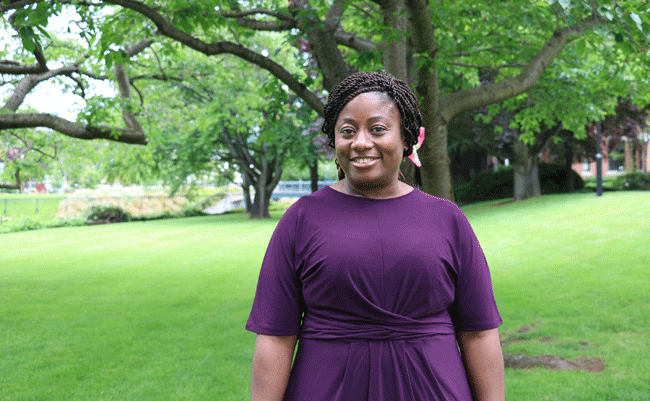
Dr Chidimma Aham-Chiaboutu, who graduated with her PhD in Public Health on Wednesday.
After working with women displaced by Boko Haram, a University of Otago graduate wants to walk alongside them as they work to improve their communities.
Chidimma Aham-Chiaboutu graduated from Otago on Wednesday with a PhD in Public Health, after completing her thesis which explored the experiences of internally displaced women in Northern Nigeria, following the Boko Haram insurgency.
Her thesis was formally recognised by the Division of Health Sciences as being of exceptional quality.
Dr Aham-Chiaboutu started her career as a nurse and midwife in Nigeria, where by chance she was selected to do training on HIV prevention and control in Nigeria. That was where she had her first real interaction with Public Health and after completing training she was able to set up HIV counselling and testing for Babcock University Medical Centre.
"They want to tell us stories about how they survived and they want to tell stories about what they did to save their husbands and what they did to save their men and how they want to be treated as human beings and not just victims of war, just waiting for us to do things for them."
“That job threw me out there into the community to do things for people in line with preventing HIV and AIDS and counselling people, and talking to them about their health and that was what opened my interest in public health and I went from there.”
She went back to study, completing an honours degree in Public Health in 2011, and then beginning her Master's degree the following year.
“I've always studied women's challenges and because I'm a midwife and I did sexual violence and sexual reproductive health, I've always been around that area. So when the Boko Haram insurgency happened we were reading in the news about women having problems with sexual violence in camps.”
Since 2009, Northern Nigeria has been under attack by an Islamic extremist group, Boko Haram. The attacks have resulted in the displacement of more than two million people, 53 per cent of whom are women.
Dr Aham-Chiaboutu decided to continue her study and found PhD supervisors at Otago.
However, when she began looking at women's experiences of sexual violence in displacement camps she realised there were more issues facing the women, and so she broadened her scope and started to speak to women about the wider issues facing them in camps.
“They came through to me as strong women who are not just looking for people to feel sorry for them. Most times when people go to help them or do things for them they kind of feel sorry for them, but they are women who actually want us to acknowledge what they have done.
“They want to tell us stories about how they survived and they want to tell stories about what they did to save their husbands and what they did to save their men and how they want to be treated as human beings and not just victims of war, just waiting for us to do things for them.”
Dr Aham-Chiaboutu's study showed the women someone cared and gave them a voice to talk about their own experiences, rather than have someone else speak for them.
“It gives them hope that something will happen, something will change. Not just for them, it's about their families, it's about their husbands, it's about their sons and it's about their communities.”
In order to improve the lives of these women and their communities, Dr Aham-Chiaboutu suggests it starts with acknowledging their strength, acknowledging what they have done and continue to do for themselves and working with them, instead of for them.
"The entire thesis would have taken a different shape if not for the supervisors that I had. They kind of tactically guided me to think differently."
One thing she says to international organisations is “enough of pictures of dying women and hungry children”. Instead of promoting victimhood and marketing their abject situations, she suggests promoting their skills and creating and enabling an environment with appropriate infrastructure to support equal educational and economic opportunities for men and women.
“It's painting pictures of people who are helpless, dying, victims who can't do anything for themselves which actually dehumanises them.”
By helping them to harness their strengths and opening their eyes to the opportunities they have, real change can be made, she says.
While reaching the milestone of graduation is exciting, completing her PhD has left Dr Aham-Chiaboutu with a sense of responsibility.
“These women have shared their lives with me, they've shared their experiences and it's a call for me to do something. A call for me to partner with them and see how I support them.”
She hopes to build a team of likeminded people and form a group of people who will work with these displaced women toward a better future.
In the meantime, she will spend the next few years in New Zealand while her husband, Godspower, completes his PhD studies.
Dr Aham-Chiaboutu also acknowledges the exceptional support she received from her supervisors Associate Professor Gillian Abel and Dr Lee Thompson, who challenged her to think critically throughout her study.
“The entire thesis would have taken a different shape if not for the supervisors that I had. They kind of tactically guided me to think differently.”
